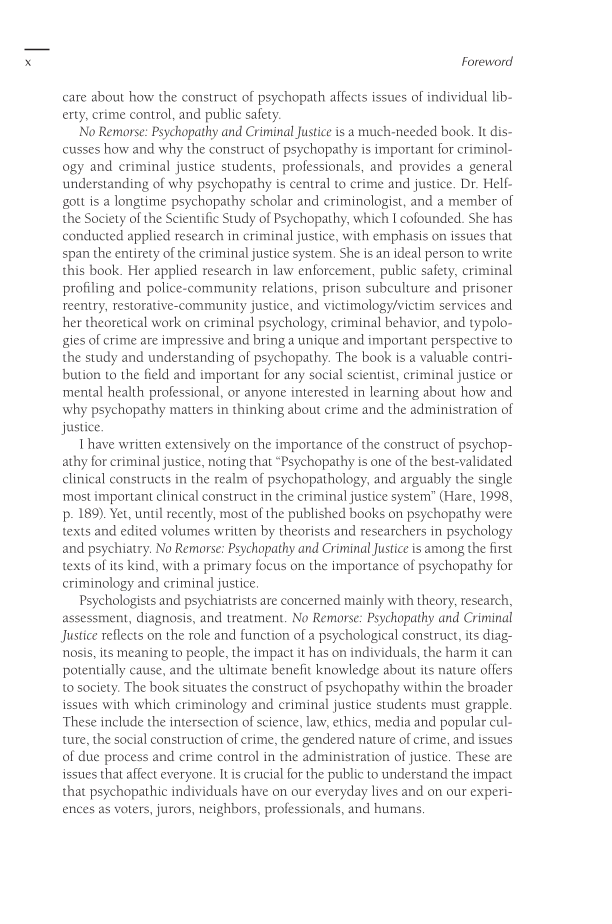x Foreword care about how the construct of psychopath affects issues of individual lib- erty, crime control, and public safety. No Remorse: Psychopathy and Criminal Justice is a much-needed book. It dis- cusses how and why the construct of psychopathy is important for criminol- ogy and criminal justice students, professionals, and provides a general understanding of why psychopathy is central to crime and justice. Dr. Helf- gott is a longtime psychopathy scholar and criminologist, and a member of the Society of the Scientific Study of Psychopathy, which I cofounded. She has conducted applied research in criminal justice, with emphasis on issues that span the entirety of the criminal justice system. She is an ideal person to write this book. Her applied research in law enforcement, public safety, criminal profiling and police-community relations, prison subculture and prisoner reentry, restorative-community justice, and victimology/victim services and her theoretical work on criminal psychology, criminal behavior, and typolo- gies of crime are impressive and bring a unique and important perspective to the study and understanding of psychopathy. The book is a valuable contri- bution to the field and important for any social scientist, criminal justice or mental health professional, or anyone interested in learning about how and why psychopathy matters in thinking about crime and the administration of justice. I have written extensively on the importance of the construct of psychop- athy for criminal justice, noting that “Psychopathy is one of the best-validated clinical constructs in the realm of psychopathology, and arguably the single most important clinical construct in the criminal justice system” (Hare, 1998, p. 189). Yet, until recently, most of the published books on psychopathy were texts and edited volumes written by theorists and researchers in psychology and psychiatry. No Remorse: Psychopathy and Criminal Justice is among the first texts of its kind, with a primary focus on the importance of psychopathy for criminology and criminal justice. Psychologists and psychiatrists are concerned mainly with theory, research, assessment, diagnosis, and treatment. No Remorse: Psychopathy and Criminal Justice reflects on the role and function of a psychological construct, its diag- nosis, its meaning to people, the impact it has on individuals, the harm it can potentially cause, and the ultimate benefit knowledge about its nature offers to society. The book situates the construct of psychopathy within the broader issues with which criminology and criminal justice students must grapple. These include the intersection of science, law, ethics, media and popular cul- ture, the social construction of crime, the gendered nature of crime, and issues of due process and crime control in the administration of justice. These are issues that affect everyone. It is crucial for the public to understand the impact that psychopathic individuals have on our everyday lives and on our experi- ences as voters, jurors, neighbors, professionals, and humans.
Document Details My Account Print multiple pages
Print
You have printed 0 times in the last 24 hours.
Your print count will reset on at .
You may print 0 more time(s) before then.
You may print a maximum of 0 pages at a time.









































































































































































































































































































































































































